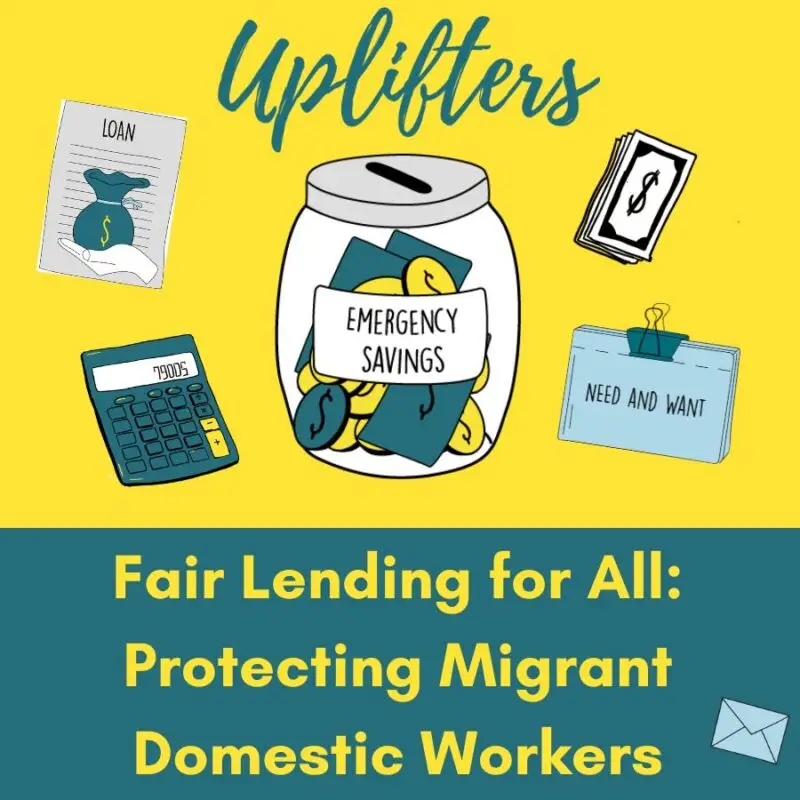The Hong Kong government recently held a public consultation on enhancing regulation of licensed moneylenders. The objective of this consultation is to bolster efforts in tackling the problem of excessive borrowing so as to better protect public interest.
In addition to being a signatory to the paper which was submitted by a group of organisations supporting migrant domestic workers (“MDWs”) in Hong Kong, Uplifters submitted separate individual recommendations based on our work with migrant domestic workers since 2018 and in consultation with Sheetal Sarup, our learning design consultant who has expertise in migrant domestic workers loan-related matters, having worked 1-1 with hundreds of them.
In line with our core principles of accountability and transparency, we are sharing the summary of these recommendations publicly.
Our comments are limited to borrowings by migrant domestic workers only and do not apply to other low-income borrowers.
- Set fair borrowing limits to enhance regulation of unsecured personal loans
Currently, there is no cap on how much MDWs can borrow, which can lead to heavy debt burdens. In response to the different government’s suggestions, we propose introducing a clear borrowing limit based on the worker’s salary and the time left on their employment contract.
We recommend a tiered system which would allow a MDW to borrow
- Up to 4 months’ salary if the worker has 12 months or more left on their contract.
- Up to 3 months’ salary if 9–11 months remain.
- Up to 2 months’ salary if 5–8 months remain.
- Up to 1 month’s salary if 3–5 months remain.
This approach balances access to credit with financial safety. Setting the cap too low could push MDWs toward illegal lenders, which often worsens financial stress to the worker and possible harassment to their employer. A 4-month cap aligns with the current average borrowing amount as stated in the public consultation document. A tiered approach allows for sustainable repayments by MDW borrowers.
- Remove referees and guarantors to strengthen protection of public interest
Some lenders require MDWs to provide a referee or guarantor when taking a loan. In practice, these referees (or guarantors) are almost always other MDWs. This creates a chain of dependency and pressure within the community.
If the borrower struggles to repay, lenders or debt collectors often contact the referee and the referee’s employer, which can lead to harassment and even strain relationships between workers and their employers. We recommend banning this requirement entirely. Lenders should make loans after having assessed an individual borrower’s repayment ability in terms of their salary and the remaining tenure of their employment as per the employment contract. Lenders should not be allowed to ask another MDW to be a referee or a guarantor to a loan.
- Stronger push for lenders to enhance their borrower affordability assessment and to join a centralised database
Some lenders approve loans without checking if the borrower can realistically repay. This results in situations where MDWs take multiple loans and end up paying more than their monthly income. Indeed, we have for example seen a MDW who secured loans from at least 4 different lenders in Hong Kong, resulting in monthly repayments of over HKD 11,000—on a monthly salary of just HKD 6,000.
We recommend:
- Mandatory affordability checks to ensure repayment is realistic.
- Lenders not be allowed to pass on this responsibility to the borrower by way of inclusion of a clause in loan agreements.
- Regular inspections of the lenders and strict enforcement to hold lenders accountable.
- All lenders join a central database to prevent multiple loans from different sources.
These measures will help prevent over-borrowing, reduce the risk of debt spirals and potential harassment to employers.
- Enhancing the complaint handling process
Borrowers need a safe and effective way to report unfair practices. Currently, complaints often lead to further harassment, including targeting employers.
In our submission, we shared numerous examples of lender practices that are in violation of the Money Lenders Ordinance (“MLO”) in Hong Kong.
We suggest:
- A dedicated hotline and email for complaints.
- A public list of lenders who break the rules.
- Clear enforcement actions against errant lenders, including publishing penalties and outcomes.
This will build trust and ensure that both lenders and borrowers uphold their responsibilities.
- Education and Awareness
Illegal online lenders are a growing threat, often using social media to target MDWs. These lenders demand personal data and install malware on phones, putting workers and their employers at risk. Indeed, many employers, whose employees have failed to repay a loan, have been targeted directly by some lenders.
We support compulsory education.
To ensure such education is available to MDW, Uplifters has co designed a new online course, “Protect Your Dreams; Protect Your Money” together with Sheetal Sarup to help MDWs borrow responsibly and avoid scams. The course includes practical tips, real-life examples, and shareable videos to spread awareness within the MDW community and their families back home. This course is FREE and will be available in early 2026.
We welcome the government’s efforts and believe these steps will create a fairer, safer lending environment for everyone.



